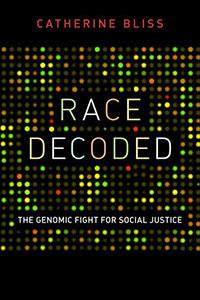
Catherine Bliss (photo by Elisabeth Fall)
Catherine Bliss Examines Race and Science in the Post-Genomic World
When Catherine Bliss, assistant professor in the UC San Francisco School of Nursing Department of Social and Behavioral Sciences, first set out to write a book on race and genomics, she decided to do more than just talk to scientists about their work. She went into their labs to observe what they actually did and consider what effect those practices might have on how science treats issues of race. She also interviewed them about their backgrounds and personal experiences to examine how their ideas of race were formulated. Those discussions and observations formed the basis for Race Decoded: The Genomic Fight for Social Justice (Stanford University Press, 2012), which explores the idea of race in a post-genomic world and the implications it has for social justice and health.
Looking at How Scientists Approach Race
Introductions from noted sociologist Troy Duster helped open the doors to the labs of well-known genome scientists, such as National Institutes of Health (NIH) Director Francis Collins; and she interviewed luminaries like biotechnologist Craig Venter, who was among the first to sequence the human genome. What Bliss found was that, despite the consensus among genomic scientists that there is little genetic basis for the concept of race, notions of race continue to inform and affect scientists’ work – especially in the health sciences, where the very real problems of access and inclusion for minorities prompt researchers to continue to use race as a central factor in designing projects.
Bliss says, “I would ask about their practices, and then I’d look into their labs at what they were actually doing. I asked them about the technologies they used. It turned out that some were racialized.”
Inadvertently Promoting Outdated Notions of Race
She gives the example of a genomic technology called admixture mapping, in which a scientist analyzes the chromosomes from a DNA sample and assigns profiles to their different components. She found that some researchers were using the technology to assign parts of the genetic code to continental racial groupings – a distinction that doesn’t exist, according to most genome scientists.
Admixture mapping is useful in that it uses the genetic ancestry of a mixed population to find gene variants that contribute to disease. But it can be problematic when race is used as a proxy for genetic variations, Bliss says, because it contributes to the idea that there are genetically distinct races, which props up racist stereotypes. She says, “There are projects focused on creating ideas about what an African genome is, what an Asian genome is. So you get what sociologists call a reification of race.”
How Social Conditioning Can Affect Science
 While most scientists don’t intend their work to be used that way, it isn’t surprising that their own experiences and biases can affect their work.
While most scientists don’t intend their work to be used that way, it isn’t surprising that their own experiences and biases can affect their work.
A basic tenet of sociology is that we act on concepts we construct in our minds, and that those concepts are social, built from shared ideas and experiences. As Bliss says, “No one can turn off being a human member of society when they get into the lab.” What this means, she argues, is that – despite the hope among many scientists that the post-genomic age would put an end to the fiction of race as a biological concept – race continues to affect science and health at both the bench and policy levels because, in a sense, we cannot escape our conditioning.
Bliss found that researchers were surprisingly eager to discuss their personal experiences with race and racism. She says, “Even though I was asking these very practice-based questions, time and again, the scientists I was interviewing would say, ‘I’m glad you asked about this, because I’m confused about what race means.’”
Seeking Genomic Solutions to Social Problems
On the individual level, this confusion about the meaning of race finds its way into scientific work, as in the example of using admixture mapping to assign racial categories to genetic characteristics. On the policy level, the persistence of biological notions of race that are used in genomic research, while well intended, threatens to divert attention and funding from examining socioeconomic issues that may have a far larger impact on health.
Bliss cites the large-scale emphasis on ensuring racial diversity across subjects of biomedical research as an example. Researchers use racial categorization to develop drugs that will help treat diseases that disproportionately affect one group of people. This is helpful, of course, for individuals and for reducing a particular disease’s burden on affected groups; but Bliss fears that, with the increasing competition for government funding, the emphasis on such race-based biomedical programs will eclipse other projects designed to address underlying environmental and socioeconomic conditions, which may be more effective in improving the well-being of minority populations. “Genomics is getting the lion’s share of funding,” she says. “You see in policy language that people are offering up genomics as a solution for health disparities. We’re trying to address a social, environmental and political problem with biological solutions.”
A Career Based on Questioning the Meaning of Race
Bliss’ interest in sociology and race was partly a product of her early experiences growing up in a “mixed-race” household; her mother was Indonesian and her father was European American. “I always wondered what race meant,” she says. “I wanted to understand the problems around it.” That led her to study sociology as an undergraduate at UC Santa Cruz, and then to her master’s program in ethnic studies at San Francisco State University, where she examined the way identities are constructed, how we form concepts of race and the ways society continues to perpetuate ideas of race.
When Bliss began her PhD program in sociology at New York’s New School for Social Research, she set out to explore the question of how scientists thought about race and the implications their approaches could have for health and social justice.
In 2013, after completing a pair of postdoctoral fellowships at Brown University (a Howard Hughes Medical Institute Fellowship at the Cogut Center for the Humanities, and an Andrew Mellon Fellowship in the Department of Africana Studies and the Program in Science and Technology Studies), she came to UC San Francisco to teach in the School’s Department of Social and Behavioral Sciences. It’s difficult to balance her research – which requires a great deal of travel – and her teaching duties, but it’s worth it, she says: “Teaching is really important to my own process of working through these ideas. Everybody’s always cross-pollinating all the time.”
Sharing Her Perspective Globally
Bliss’ work has garnered attention in both biological and social scientific circles, and she is now regularly invited to discuss it in venues as diverse as the European Molecular Biology Laboratory in Heidelberg, Germany, and the Asian/Pacific/American Institute at New York University. In 2014, Race Decoded won the American Sociological Association’s Oliver Cromwell Cox Book Award, which, according to the association, “recognizes sociologically related books…that make a distinguished and significant contribution to the eradication of racism.”
Bliss is currently working on a new book on social genomics, examining the intersection of genomic science and behavior, and the questions it poses. She hopes that by using the dual lenses of biological and social sciences, she can increase understanding of the issues that affect the well-being of all people and encourage researchers and policymakers to take a multifaceted approach to tackling these issues. “There are social and environmental issues that need to be addressed immediately,” she says. “I’d love to see the government put billions of dollars into addressing the actual causes of health disparities.”



